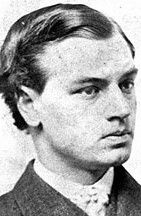
Previously in the novel: War Secretary Stanton holds the Lincolns captive under guard in the White House basement. Stanton selects Duff, an AWOL convict,to impersonate Lincoln. Duff learns how to conduct cabinet meetings. Alethia, the woman playing Mrs. Lincoln, has had a carriage accident. He goes to see her at the hospital in Maryland.
As Duff rode back from Anderson Cottage, he thought about Alethia and Tad. His heart raced as he remembered the touch of her soft skin. The tenderness in her eyes raised hopes that she loved him as much as he loved her. But there were secrets, secrets, secrets—even the clanging of the carriage wheels pounded out the secrets, secrets, secrets. Duff smiled as he thought of how much Tad had matured in the last year. He had been inconsiderate, brash, and irresponsible, never thinking of others’ feelings; now, he put aside his enjoyment of the street parade to comfort a woman he knew was not his mother.
Back at the Executive Mansion, with the sun already setting beyond the Potomac River, Duff listened for the impending march, pounding of drums, and crackling of torches down Pennsylvania Avenue. He looked forward to the parade, an event yet to be experienced, even though those around him thought he had experienced it before.
“The parade’s turning the corner,” Tom Pendel said. “The window’s all prepared, sir. All the candles are lit.”
Smiling at the white-haired doorman, he tried to find a stance that Lincoln would take. Duff breathed in deeply as Pendel pulled open the curtains and breathed out in relief as he heard the roar of the crowd on the street. Pendel held the tall candle just out of view at window’s edge. Feeling the warmth of the flame, Duff briefly felt imbued with confidence, until he realized the candlelight lit his neck and chin, not his full face. Glancing down, he saw Pendel looking at the floor, his arm raised routinely high enough to illuminate Lincoln’s face. Evidently, Duff was slightly taller than the president. An awful moment of revelation passed slowly when Pendel’s eyes moved up and he became aware the candlelight was in the wrong place. Quickly he raised the candle, but his eyes stayed fixed on Duff’s face. Duff was flushed with humiliation. What would Pendel say? Several minutes passed as Duff waved to the crowd before it went down the street and turned toward the Mall, where a stack of old wood and trash waited to become a bonfire. As the lights dimmed from sight and the bonfire lit the evening sky, Duff turned to Pendel and forced a smile.
“Too bad Tad decided to stay at Anderson Cottage. He always liked the candlelight parades and bonfires.”
“Yes, sir.” Pendel kept his head down as he blew out the long candle.
Duff excused him and fled to his bedroom, where he threw off his clothes and put on his nightshirt. He did something he had not done in years. He fell on his knees, clasped his fingers together, and emitted moans from his heart only God could hear.
“Forgive me,” Duff said in guttural tones from the bottom of his belly. “Forgive me for my sin, my secrets, and my many offenses.”
“Father?”
Recognizing Robert Lincoln’s voice, Duff stood, buttoned the top of his nightshirt, and turned, hoping Robert had not heard him.
“I heard what you were praying.” Robert sounded uncertain.
“Robert, I thought you weren’t coming home.” Duff stood, grabbed the bedpost, and smiled. “Your mother’s fine.”
“No, she’s worse. The train stopped at Anderson Cottage long enough for me to see her. She got worse after you left. Tad’s there.” He paused. “I know I haven’t been as cooperative as I should.” Robert’s eyes went to the floor. “When I saw those bandages on Mother’s head, I realized parents don’t live forever.”
“It’s not all your fault, son. Sometimes, I’m sure, you feel I don’t trust you enough to tell you the truth.”
“You don’t have to apologize, Father,” Robert said. “I know you have to keep secrets from me, and I know you feel responsible for all the deaths in the war. God forgives you.” He scrunched his face in pain. “But I need you to forgive me. Please forgive me.” He stumbled toward Duff with his arms outstretched, pleading. As Duff hugged him, he burst into tears.
“I forgive you,” Duff whispered, even though his mind wandered to Alethia and if she would forgive him if she knew his secrets, his deep, horrible secrets.
Tag Archives: Civil War
Lincoln in the Basement Chapter Fifty-Seven
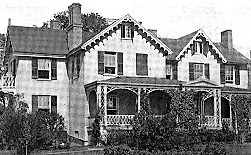
Previously in the novel: War Secretary Stanton holds the Lincolns captive under guard in the White House basement. Stanton selects Duff, an AWOL convict,to impersonate Lincoln. Duff learns how to conduct cabinet meetings. Alethia, the woman playing Mrs. Lincoln, has had a carriage accident. He goes to see her at the hospital in Maryland.
Entering the small hospital room next to Anderson Cottage, Duff was taken aback by how small Alethia looked in the bed, how fragile, with gauze wrapping the side of her head. She appeared asleep, but when he closed the door, she opened her eyes and smiled, her cheeks moist with perspiration.
“How’s Tad? Was he upset he couldn’t see me?”
“First words out of his mouth were about you. He’s calm. He told me to say he loved you.”
“He’s such a dear boy.” Her head relaxed on the damp pillow. “Even though he knows I’m not his mother, he loves me.”
“He says I’ve a fat butt, but that’s all right.”
“Don’t make me laugh. I’ve this frightful headache.” She closed her eyes. “Is Mr. Forbes all right? They haven’t told me anything since he wrecked the carriage. I overheard someone say the bolts had been loosened on the driver’s seat.” She sighed. “Someone’s trying to kill you, Father.”
“Can I get you anything?” Duff sat on the edge of the bed and patted her hand.
“Send Mrs. Keckley up here tomorrow. I hate to take the nurses away from the men. I know she won’t mind waiting on me.” Alethia paused. “She’s so kind. I think she knows who I am—or rather, who I’m not—but she doesn’t care.”
“I thought you might like to read this,” he said, pulling from his pocket Rose Greenhow’s book and handing it to her. “My Imprisonment and the First Year of Abolitionist Rule at Washington.”
“Rose wrote a book!” Her eyes widened. “I didn’t know she was out of prison.”
“The book says she was released last fall to the Confederates. She went to London, found a publisher, and wrote her memoirs.”
“I knew she could talk her way out of anything.” Alethia opened the front page and squinted at the dedication. “To Alethia Haliday, our unknown hero who disappeared in Old Capitol Prison while in service to the Confederacy.” Her mouth flew open. “There’s my name!”
“Shush. Don’t tell anyone.” Duff smiled as he squeezed her hand.
“At least I know Rose is alive and well.” Alethia smiled and squeezed his hand back, lifting it to her lips to kiss.
“Are you sure you’re all right?”
“I’m sure.” She paused. “Does Robert know?”
“I sent him a wire.”
Touching her head, Alethia moaned.
“Let me get the doctor.”
“No, not yet. I’m enjoying your company.”
“Then I won’t return to Washington tonight.”
“With the nation celebrating a victory? You have to be there for the candlelight parade.”
“You would’ve have been a wonderful politician’s wife.”
“Besides, Tom Pen wouldn’t get to light the oval room window as you stand waving to the crowd. He’d be so disappointed.” Her smile faded as she moaned again.
“I must get the doctor.” Duff left the room and grabbed the first doctor he saw to have him attend to Alethia’s head wound.
Back at Anderson Cottage, Tad waited, sitting on the floor, meticulously unraveling the rug, strand by strand. When he saw Duff, he jumped up and opened the screen door.
“Is she all right? Does she still have a fever?”
“Yes, the fever’s returned, but it’ll pass. She asked about you.”
“She did? I’m glad.”
“Do you want to go back to town with me? There’s going to be a candlelight parade tonight.”
“With bonfires?”
“I suppose.”
“And Tom Pen’s going to light the window with candles, and you and me can stand there waving to all the people?”
“Of course.”
“Gee, I ain’t stood in the lighted window with Papa—I mean, with—I ain’t stood in the window since last July Fourth. There ain’t been no big battles won since—in a long time.”
“Yes, it’s been a long time.”
“She still ain’t feeling good, is she?” Tad looked off at the long white barracks where Alethia lay, wracked with aches and fever.
“No, she isn’t.”
“It’d make her feel good if I stayed here and sat with her tonight, wouldn’t it?”
“Yes, it would.”
“There’ll be other candlelight parades.” He narrowed his eyes in deep thought and sighed. “The lady needs me right now.”
“You’re a good boy, Tad.” Duff hugged him and bent down to whisper in his ear, “I’d be proud to have you as my own son.”
“You better go now.” Tad stepped back and rubbed his nose across his arm. “The people need you.”
Lincoln in the Basement, Chapter Fifty-Six

Previously in the novel: War Secretary Stanton holds the Lincolns captive under guard in the White House basement. Stanton selects Duff, an AWOL convict,to impersonate Lincoln. Duff learns how to conduct cabinet meetings. Alethia, the woman playing Mrs. Lincoln, has had a carriage accident.
His pounding heart drowned out the horses’ hooves as Duff’s carriage bumped and clanged along the rocky path into the Maryland foothills to the Soldiers’ Home. He sensed a cool breeze in his face, yet not cool enough to relieve the burning on the back of his neck. Alethia’s gentle voice, the touch of her loving fingers, and her soft bosom on which he had laid his head and cried himself to sleep—they all were important to him now. The clopping slowed, and his eyes focused on Scott Dormitory, a large building filled with wounded and ill soldiers, and Anderson Cottage on the right. A smile flickered across Duff’s broad, thick lips when he saw Tad waiting for him on Anderson Cottage’s large, covered porch, outlined in white gingerbread trim.
“Is she going to be all right?” Tad whispered.
“I haven’t seen her yet.”
“I want her to be all right.” He hugged Duff tightly around his waist. “I like her very much.” His hands slid down Duff’s backside. “Your butt’s fatter than Papa’s.” Tad’s eyes softened. “But it’s a nice butt.”
“Thank you, Tad.”
“You better check up on her. Tell her I love her.” Tad lowered his eyes and backed away.
Duff walked through Scott Dormitory’s front door into a long ward of cots along each wall. Wide, tall open windows allowed cool foothill air to waft in. Within seconds, soldiers struggled from their cots to stand or at least sit up to applaud. Duff ducked his head, trying to hide his cheeks flushed with embarrassment. A doctor rushed to him.
“Don’t worry, Mr. President,” he said pumping Duff’s hand. “There have been complications, but I felt the wording of the telegraph was overly dramatic.”
“Where is she?”
“In that small room.” He pointed to a door at the end of the ward.
“Thank you.” Duff stopped to talk to the men, patting their thin backs as he walked to the rear. One particular man with an arm missing lowered his head when Duff approached.
“I know I ain’t the best lookin’ man in the world,” said Duff, “but it can’t hurt your eyes too much to look at me.”
“It ain’t that, Mr. President. I’m ashamed.”
“Ashamed of what? That you gave only one arm for your country?”
“We ran away.” He rolled over.
“What?” Duff walked to the other side. “I didn’t catch what you said.”
“We ran. All of us. Like scared rabbits.”
“Hmm.” Duff thought of his own experience, and then touched the soldier’s shuddering shoulder. “That reminds me of a story I heard back in New Salem. This boy and his girl were caught in an embarrassing situation by her father, who took umbrage—and a gun—to the boy. Well, he lit out down the road. As luck would have it, a rabbit was runnin’ down the road. ‘Git out of the road, old hare,’ the boy says, ‘and let somebody run that knows how.’”
Others laughed, and the soldier smiled and wiped tears from his eyes.
“We all run faster than the rabbit at one time or another,” Duff said.
He rose and was about to enter the small room, when another soldier, older and more grizzled, intercepted him.
“I hope the missus is all right, Mr. President.”
“The doc says she’s on the mend.”
“Don’t take no offense, Mr. Lincoln, but if this accident had happened a year ago, no one would’ve much cared. But she’s changed in her ways, and we noticed it. I mean no offense…”
“No offense taken,” Duff said, trying to hide his pleasure that they cared more for the woman he loved than the woman she pretended to be. “You know, Mrs. Lincoln led a sheltered life before she married me. It took her awhile to get used to my backwoods ways.”
“I knew you’d understand.” He flashed a grin interrupted by large gaps between the brown teeth. “You’re one of us. We’re all praying for her.”
“Thank you, sir.” Duff liked talking with honest, rough men who were what he wished he had been.
Lincoln in the Basement Chapter Fifty-Five

Previously in the novel: War Secretary Stanton holds the Lincolns captive under guard in the White House basement. Stanton selects Duff, an AWOL convict,to impersonate Lincoln. Duff forms his own opinions about cabinet members, including Navy Secretary Gideon Welles.
Duff paused to look at the executive office second-story window and found Stanton gone. That meant the secretary of war was waiting. He feared what Stanton wanted to tell him. He climbed the service stairs, trying to compose his thoughts. When he entered the second-floor hallway and passed through the etched glass panel into the office, Duff heard Stanton instructing Hay.
“You may have your dinner hour now.”
“But I’ve a couple of questions about my notes,” Hay replied.
“I’ve a private appointment with the president which may last hours.”
“Would you like for me to stay to take notes?”
“I said I want you to leave the building. I’ve been quite clear.”
Duff detected a pause.
“Oh. Yes, sir.”
Entering the office with all the casualness as he could feign, Duff smiled at them. “Ah, Mr. Stanton, you remembered my order to stay for a couple of hours.” Taking pleasure from Stanton’s pinched Cupid’s bow lips, Duff winked at Hay and laughed. “I shouldn’t be too hard on the old man.”
Stanton’s cheeks burned bright red, and Duff flung one of his long, gangling arms around Hay’s shoulders. “I hope Secretary Stanton didn’t try to boss you into forgoing your dinner to take notes on our strategy session.”
“No, sir.”
“That’s good. I’ve noticed Mr. Stanton oversteps his authority by ordering around my personal staff.” Duff laughed again. “You know, he reminds me of the barnyard cock who strutted around the hens, thinking his crowing made the sun rise.”
As Hay chuckled, Duff pushed him out the door, firmly shutting it behind him.
“That,” Stanton said in an angry whisper, “was totally uncalled for.”
“Oh, I don’t know,” Duff replied. “I thought it sounded like something Mr. Lincoln would say.” He sat behind the large oaken desk, hoping to hide his shaking leg.
“Yes, and you know where his arrogance got him.”
“Mr. Stanton, a day doesn’t go by that I don’t think about Lincoln in the basement.” He looked grave. “What do you want?”
“You know very well.” Stanton walked to the desk, planting both fists on it. “What did Mr. Welles say to you?”
“That bewigged, doddering old fool? Merely gossip.”
“Gossip? What kind of gossip?”
“The campaign in Vicksburg will end successfully, possibly today.”
“And?”
“He wants Grant to replace Meade.”
“Why replace the victor of Gettysburg?”
“Circumstances change quickly. Our record of changing generals suggests that trend will continue.”
“You see-it’s futile to keep a secret from me.” Stanton cocked his head to eye Duff. “You’ve another secret.”
“Nothing serious.” Duff stalled Stanton, thinking of some crumb to toss him, something to appease him, something somewhat related to the war—but not connected to Alethia.
“It’s foolish to defy me. Spit it out.”
“It’s something Mr. Hay said. Don’t blame him. He thought he was reporting it to the proper authority.”
“What?”
“He came to my bedroom several months ago…”
“You waited to tell me?”
“I had my reasons. One being concern for your personal life.”
Stanton took a step back.
“As I was saying, he visits me often late at night to share stories he’s heard at some party. I didn’t know social gossip interested you. Besides, it involves someone you know.”
“Who?”
“Jean H. Davenport Lander.”
“Don’t believe gossip.” He shuffled his feet. “I was between marriages when Jean and I—enjoyed each other’s company. This was before she married Colonel Lander.”
Duff gained confidence; for once, he held the upper hand. Smiling at Stanton, Duff was certain he saw beads of perspiration across his brow.
“Mr. Hay, it seems, talked to her at this party.”
“Go on.”
“She seemed concerned, he said, about a young Virginian she had met who boasted of a great, daredevil thing.”
“A daredevil thing?”
“What if he were planning an assassination?”
“That’s highly unlikely.”
“I thought, how ironic if I were killed instead of Mr. Lincoln.”
“Did she mention his name?”
“I don’t know.”
“If Mr. Hay mentions it again, tell me.”
Before Duff responded, office messenger Tom Cross rapped softly at the door and opened it. He timidly stepped in, his eyes wide with apprehension.
“Yes, Tom. What is it?” Duff asked.
“We just received a message from the Soldiers’ Home.” He paused to swallow hard. “They want you to come immediately. Mrs. Lincoln’s condition, it’s worse. She’s got a fever and is in and out of consciousness.”
Lincoln in the Basement Chapter Fifty-Four
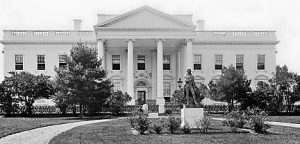
Previously in the novel: War Secretary Stanton holds the Lincolns captive under guard in the White House basement. Stanton selects Duff, an AWOL convict,to impersonate Lincoln. Duff forms his own opinions about cabinet members.
As the Cabinet members left, Welles turned to Duff.
“Mr. President, would you walk with me to the gate?”
“No,” Stanton interjected. “He’s much too preoccupied.”
“I’m not preoccupied at all.”
“Good,” Welles replied, taking Duff by the crook of his arm and leading him down the hall. “How’s Mrs. Lincoln after her carriage accident?”
“Very well,” Duff said, ignoring the exasperated grunts from Stanton behind them. “Doctors at the Soldiers’ Home said her head injuries were minor. It’ll be good for her to recuperate in the cool Maryland foothills.”
“Yes, it can be quite sweltering in Washington during the summer months.”
They began down the grand staircase.
“You know, Mrs. Welles always inquires about Mrs. Lincoln. She’s quite fond of her. Often she has protested the unfair attacks on her in the newspapers.”
When they reached the foyer, Welles gave a wary glance up the stairs and then at the front door guard, John Parker, who was already red in the face from drinking.
“Good morning, Mr. Parker,” Duff said. “I’m escorting Mr. Welles to the gate. I won’t be long.”
“Very well, sir.” Parker’s voice was thick with whiskey.
As they walked down the steps, Welles leaned into Duff.
“I wanted a private word with you, Mr. President,” Welles said in a hushed voice. “It seems Mr. Stanton has been omnipresent the last few months.”
“Really? I hadn’t noticed.” Duff raised an ingenuous eyebrow.
“Mr. President, I wish I had your gentle wit.” Welles chuckled and shook his bewigged head.
They took a sharp turn to stroll through the garden to the turnstile gate.
“What’s on your mind, Mr. Secretary?”
“I was less than forthcoming during the Cabinet meeting,” he whispered. He stopped to examine a rose bush. “I wish I still had my sense of smell. Roses have a marvelous bouquet.” Again Welles looked up, this time at the second-story window, where Stanton stood glaring at them.
“I assume you weren’t forthcoming because of Mr. Stanton.”
“I don’t trust him.” Welles straightened and looked at Duff. “He exudes the aura of frustrated ambition. Put quite bluntly, Mr. President, he covets your job.”
“So do Mr. Chase and Mr. Seward.”
“But not as much as Mr. Stanton.”
“So what do you want to tell me?”
“I’ve my sources at Gettysburg,” he whispered as he gripped the top of the turnstile gate. “On both sides. I don’t want Mr. Stanton to know.”
“What is it?”
“On the Confederate side, my sources say General Lee isn’t well.”
“I’m sorry to hear that.”
“It’s his heart,” Welles said, leaning into Duff. “His appearance indicated a heart attack. If that’s so, his judgment’s impaired. He’ll make mistakes. His decision to attack Little Round Top was disastrous. There’s no question his decision to charge the center of the Union line today will be an unequivocal failure.”
“So that’s good for us, correct?”
“Not necessarily. My sources on our side tell me General Meade errs on the side of caution to the extent he won’t pursue Lee when he retreats.”
“That wouldn’t be good.”
“Your understatement is amusing,” Welles said wryly. “You—we—will need a replacement for General Meade.”
“Of course.”
“Before Mr. Stanton makes his suggestion, I’d like to recommend General Grant.”
“But he’s mired in the Mississippi mud outside Vicksburg,” Duff said. “And my sources tell me he’s disappeared in the bottle.”
“My sources,” Welles said, shaking his head, “which I assure you are faster and more accurate, say Mrs. Grant arrived in camp, and the drinking stopped.” His mouth went close to Duff’s ear. “They also say he’s close to a great victory. Vicksburg’s capitulation may come as soon as tomorrow.”
“Thank you for your information,” Duff said, glancing over his shoulder to the second-story window, where Stanton still glared down upon them. “I’ll consider your recommendation of General Grant most seriously—as I’ll consider nominations from other Cabinet members.”
“Don’t let Stanton sway you.” Welles grabbed Duff’s arm. “He’s one of that breed who believes it’s impossible that he could be wrong, therefore any action he takes is justified.”
“We all, at one time or another, have to fight such delusions,” Duff said with a slight smile.
“If, sir, you’re implying I’m suffering from that delusion,” Welles said, pulling away from Duff, “you’re wrong.”
Deciding to allow prudence to prevail, Duff nodded and extended his hand. A moment passed before Welles took it. He turned abruptly, went through the turnstile, and walked down the path to the War Department.
Lincoln in the Basement Chapter Fifty-Three
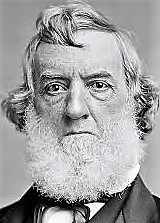
Previously in the novel: War Secretary Stanton holds the Lincolns captive under guard in the White House basement. Stanton selects Duff, an AWOL convict,to impersonate Lincoln. Duff forms his own opinions about cabinet members.
Leaning back in his chair, Duff relaxed, confident of handling the Cabinet meeting. He was learning to deal with the egos of all the self-important men around the table. He liked some more than others. Attorney General Edward Bates reminded him of himself, little formal education and even less pretension. Duff still mourned the death of Interior Secretary Caleb Smith, a Midwesterner like himself. Smith’s replacement, John Usher, was a mystery to him. Since Stanton had recommended him, Duff did not to trust Usher.
“Mr. President, the gallant men of Maine should receive special commendation for their defense of Little Round Top yesterday,” Stanton said. “They saved Gettysburg from falling to the rebels.”
Absolute loathing covered Duff like a cold, wet wool blanket, and he remembered that sensation from his days prior to the first battle of Manassas. As much as he was choked with fear at the battle and as much as he was smothered by terror when he was captured, Duff felt even stronger emotions toward Stanton, who was adjusting his pebble glasses on his little nose. Duff nodded in acknowledgement of Stanton’s announcement but said nothing. He learned this was the safest response to any comment during a Cabinet meeting.
“The latest telegraph reports indicate today’s events should be the most pivotal since the second Manassas,” Stanton continued.
“Ah, fireworks for the Fourth of July,” Duff replied.
Laughter filled the room and boosted his self-esteem and eased his hatred toward Stanton. Among the others around the table, only one merited Duff’s respect: Secretary of the Navy Gideon Welles. He had to be careful not to be too friendly. The real Lincoln found Welles senile and altogether ludicrous in his large, ill-fitting white wig. Duff, on the other hand, found Welles to be profoundly wise.
“When was the last wire received?” Seward asked.
Duff did not trust Seward, whom he found hard to decipher; in other words, he could not tell if Seward believed him to be Lincoln.
“Wires within the last hour indicate Lee’s forces appear ready to advance on the center of General Meade’s line,” Stanton replied.
“Is this necessarily a bad thing?” Chase intoned.
Chase evoked mere disdain from Duff, who saw him as a sanctimonious fool. He did not worry if Chase realized he was not Lincoln, because Chase never looked him in the eye or listened to what he said, as though Duff were inconsequential.
“We don’t know at this time,” Stanton said.
Most of all, Duff hated Stanton for his contemptuous attitude Stanton of Alethia, whom he had grown to love over the past year. Duff hesitated to tell her, because then he would have to tell her his secrets, and if she learned of all the horrible sins he had committed, she would surely hate him.
“Will you keep us informed?” Welles asked.
“Of course.” Stanton smiled with condescension.
“I was talking to Mr. Lincoln,” Welles retorted.
“Everyone at this table has access to the telegraph wires at the War Department,” Duff said, noticing the grimace on Stanton’s face.
“I know that.” Welles nodded. “I just wanted to hear it from you. Sometimes it becomes a bit weary, learning official war news from Mr. Stanton.”
“Mr. Welles, may I remind you I’m the secretary of war; therefore, by definition, all information concerning the war should come through me.”
“Forgive me, Mr. Stanton, but as attorney general,” Bates interjected, “it’s my obligation to remind you that the Constitution names the president as commander in chief of the armed forces, therefore superseding you as the ultimate authority on releasing war news.”
“I stand corrected.” Stanton pursed his Cupid’s bow lips.
Duff could hardly restrain the smile creeping across his lips; instead, he surveyed the room, trying to look wise. No one seriously doubted he was president, he decided, except Stanton.
On his staff, the only person who might suspect something was Nicolay, so Duff had sent him on a special mission to Colorado. With any luck, the war would end by the time he had returned. While Duff never thought himself to be bright, he prided himself on detecting intelligence in others, and he deemed Nicolay one of the smartest men in Washington, which made him dangerous.
“Mr. Hay, do you have all this commotion on paper?” Duff asked.
“Yes, sir.”
“And it was all clear as mud, correct?”
Hay laughed and nodded his head.
He was a good boy, Hay was, but not as bright as Nicolay, Duff thought. Perhaps he was as smart as Nicolay, but he was so preoccupied with pretty women and strong liquor that his keener senses were unnaturally blunted. Hay did not consider it strange that Duff sent him to a bookstore to buy a copy of Rose Greenhow’s prison memoirs, My Imprisonment and First Year of Abolitionist Rule in Washington, not questioning why President Lincoln would be interested in a book written by a rebel spy.
“Is there any other business?” He looked pointedly into the eyes of each Cabinet member. When no one spoke, Duff sighed. “Then, let us adjourn to prepare for Independence Day.”
FIFTY-FOUR
Lincoln in the Basement Chapter Fifty-Two

Previously in the novel: War Secretary Stanton holds the Lincolns captive under guard in the White House basement. Janitor Gabby Zook by accident must stay in the basement too.
This makes him witness to conversations he doesn’t want to hear.
Have a seat, Mr. Secretary,” Lincoln said. Scratching of chairs covered another comment which Gabby couldn’t understand. Lincoln chuckled and Stanton harrumphed.
“The information from Chancellorsville was late yesterday afternoon. There was a surprise attack led by General Jackson.”
“How bad was it?” the president asked.
“Hooker was caught off-guard and—“
“More lives lost.” Lincoln sighed. “More lives will be lost.”
“Meade acquitted himself well, but it was not enough.”
“Meade’s a good man.”
“Hooker must be replaced,” Stanton said.
Gabby became aware of an awkward pause.
“Or perhaps he should be given another opportunity,” Stanton offered. His tone was softer.
He wanted Lincoln to decide, Gabby thought, but Stanton did not want to say so. The war secretary wanted the president to say what he would tell the cabinet upstairs, except he was still locked in the basement. The president, Gabby repeated in his mind. If he—Gabby–were actually president, then perhaps Stanton was waiting for him to step from behind the crates and barrels to tell him what to do. Gabby moved a foot slightly before two other thoughts seeped into his mind: he did not know what to do, and if he were indeed president, he would follow the adage that the leader who leads least, leads best.
“And if Hooker were replaced,” Stanton continued after another long silence, “who’d replace him?”
Again, stinging silence controlled the room.
“You’ve nothing to say?” Stanton asked.
“Oh. You expected a response,” Lincoln ingeniously replied. “I presumed you were merely thinking out loud.”
“You know very well I wasn’t.” Stanton spat. “If I wish to think aloud I needn’t come here.”
Gabby heard Lincoln’s sigh and respected his remarkable restraint.
“Where will you put me if I’m wrong this time, Old Capitol Prison?”
Stanton began to gurgle in indignation.
“I apologize,” Lincoln said. Gabby thought he should not have. “Try to forget what I said. I seem to be in the middle of a malaise. Why I should be melancholy I don’t know—once again I slide into irony. It’s the Union’s future that’s important, and not me.”
“Thank you, sir,” Stanton whispered.
“Replace Hooker with Meade. With whom we shall eventually replace Meade can be discussed another day.”
Very wise that I stepped back to allow Lincoln to decide, Gabby thought. He did well. Chairs shuffled about, indicating Stanton was leaving.
“Mr. Stanton?” Mrs. Lincoln’s voice was subdued.
“Yes?” he wearily replied.
“I’m worried about Private Christy. His clothes are disheveled and his hair—“
“His appearance is his own business.” Stanton turned away.
“I’m not complaining about his appearance,” Mrs. Lincoln persisted. “It’s the reason for his appearance. He’s not happy.”
“We’re at war.” H emitted a brutal laugh. “No one’s happy.”
Before she could reply, the door opened. Gabby could see that it was Adam returning the chamber pots. Stanton left, and Lincoln disappeared behind his curtain. Mrs. Lincoln just stood there, eyeing Adam with sympathy. Gabby wanted to help. After Adam put the pots in their respective places, Gabby remembered what the strange man in the straw hat said to him. He reached out to touch the private’s arm.
“Ocean waves taught me always to see beyond the things on hand as the ocean always points beyond the waves of the moment.”
“Huh?”
Gabby followed Adam to the door.
“Young men are meant to laugh and play.”
“All right.” Adam wrinkled his brow as he unlocked the door to leave.
“Do you have a strong, lean, white belly?” Gabby reached out to touch his midsection, but Adam opened the door and stepped out into the hall.
As he heard the key locking the door, Gabby earnestly added, “Your nation needs you.”
Lincoln in the Basement Chapter Fifty-One
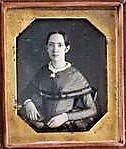
Previously in the novel: War Secretary Stanton holds the Lincolns captive under guard in the White House basement. Janitor Gabby Zook by accident must stay in the basement too.
This makes him witness to conversations he doesn’t want to hear.
Lingering at the corner of the crates and barrels, Gabby watched Mrs. Lincoln pick up the picture frame, focus her small brown eyes on it, and turn a bright scarlet. Her cheeks puffed out. Lincoln stopped when he saw his wife staring at it. Gabby knew yelling was about to begin, and his stomach tied into knots. He lost his appetite for his fried eggs. The air in the basement room became hotter and thicker. This wasn’t any of his business, but Gabby had to listen to it. He had no place to go. He was trapped like one of the rats he used to set traps for. Even as scared as he was, Gabby couldn’t help but peek around first stack of crates.
“Oh,” was the only word Lincoln could say. His head went down, and he stuck his hands in his pockets.
“I thought you left this photograph in Springfield.” Mrs. Lincoln’s voice was soft, but intense.
He cocked his head and shrugged. “Looking at it makes me forget for a few minutes about this awful war.”
“Looking at me is supposed to do that.” Her eyes welled with tears. “I’m your wife. I’m supposed to give you comfort. But it seems you don’t want any comfort from me!”
What kind of picture would provoke Mrs. Lincoln to such anger, Gabby wondered as he peered around the crates. The frame was small, perhaps three by five inches, not ornate but plain. Could it be a photograph of their first child who died? Shaking his head, Gabby decided that was not it. He would be very happy to have picture of his father, and no one could get mad for him having it.
Lincoln awkwardly tried to but his long arms around her tiny body, but she jerked away in holy indignation.
“You promised me you wouldn’t bring it.” After a cold moment of silence, Mrs. Lincoln flung the picture across the room.
Gabby’s eyes widened as Lincoln scrambled to pick up the frame, running his bony fingers over it, to check to see if the glass had broken. Lincoln returned it to his coat pocket and walked slowly to his wife.
“She was only a child. And now she’s dead.” Lincoln’s voice almost cracked. “She’s not a threat to you.”
“Not a threat!” Mrs. Lincoln’s face twisted. “That trollop has tormented me through my entire marriage!”
“Don’t call her that.” Lincoln’s hand impulsively reached to the pocket holding the photograph. “She was a sweet, innocent child who encouraged my dreams.”
“I didn’t encourage your dreams?” Mrs. Lincoln’s hysteria grew.
“I’ve told you; it isn’t even her in the photograph.”
“But it looks like her. That’s why you bought it.” Mrs. Lincoln’s eyes narrowed.
Gabby wondered who the girl in the picture was to create such a torrent of emotions between the Lincolns. She must have been a former girlfriend of Lincoln. She supported his dreams, Gabby sighed. Joe had encouraged his dreams, and he had supported Joe’s dreams. Joe had died, and all their dreams vanished with him. Gabby’s thoughts turned to his sister Cordie. He couldn’t her ever saying anything about his dreams. She was too busy trying to keep a roof over their heads and making sure they had something to eat.
“You’ve never loved me.” Tears rolled down Mrs. Lincoln’s cheeks. “Ann Rutledge won your heart, and she has it still.”
Lincoln took a deep breath, and Gabby expected a reasoned reply from him, but the door opened, and Stanton strode in, breaking the tension. Mrs. Lincoln, wiping her tears away, turned to disappear behind her French lace curtains, barely acknowledging the secretary of war. Shuddering, Gabby retreated further into his corner with his plate of fried eggs. Stanton scared the hell out of him. He cocked his head to eavesdrop.
Lincoln in the Basement Chapter Fifty

Previously in the novel: War Secretary Stanton holds the Lincolns captive under guard in the White House basement. Janitor Gabby Zook by accident must stay in the basement too.
Jangling keys and the turning of a lock jarred Gabby’s thoughts from the past to his empty stomach and his full chamber pot. Gabby carried it carefully around the crates and barrels, depositing the pot by the door. He waited for Adam and the breakfast tray.
“Private Christy,” Mrs. Lincoln said graciously as she emerged from her French lace curtains. “Good morning.”
Adam kept his eyes down as he put the tray on the billiards table. Gabby could tell he was sinking into melancholia, a place Gabby himself visited many times and for extended periods. If the boy tarried there too long, he might find it hard to return. Gabby frantically tried to figure how to throw Adam a lifeline.
“Is it going to be another sweltering day, Private?” Mrs. Lincoln persisted in her pleasantries. “It’s been absolutely stifling. I’ve been glowing, absolutely glowing.”
“Yes, ma’am,” Adam said in muted tones. “Another warm day.” He avoided eye contact and went to the door.
“I appreciate your kindness, Private. Really I do.”
“Thank you, ma’am.” Adam turned to her and managed a weak smile.
“Father?” Mrs. Lincoln called out after Adam had left, and she had heard the lock clank shut.
The tall, bearded man—who Gabby sometimes thought was president of the United States when he was not certain he himself held that title—walked out of his makeshift bedroom, brushing his shaggy hair away from his brow.
“Now what, Molly?” he asked in a tired voice, which sounded like Adam’s sad, muted tones.
Gabby frowned as he realized the similarities between Adam and Mr. Lincoln—the long, unruly locks and vacant stares. This was a time for him to keep his wits about him, Gabby told himself as he subconsciously brushed his own hair out of his eyes.
“I want you to talk to Private Christy,” Mrs. Lincoln said.
“What about?”
“He seems to be suffering from some malaise,” she replied, walking to the billiards table to look at the tray. “Fried eggs again.” She looked up. “Mr. Gabby, come get your breakfast.”
“Fried eggs again?” His head down, Gabby shuffled toward the table. “I like fried eggs. Eggs taste good. Rooster eggs are best. Once the roosters jump on the back of the hens and pump them then the eggs can become chicks, if we don’t eat them first. Wonder what it is about the rooster’s stuff that makes the eggs taste better?”
“I have no idea, Mr. Gabby,” she replied with reserved disgust. “This isn’t actually a proper topic for conversation.”
“Do you know if these are rooster eggs?” he asked, ignoring her comment. “I guess you don’t since you haven’t been out of this room for almost a year. I haven’t been out of this room for almost a year, almost a year without Cordie. Cordie doesn’t like fried eggs. She doesn’t like the runny part—”
“Mr. Gabby.” Closing her eyes, Mrs. Lincoln firmly grasped his hands. Her voice was frantic, but soft and fragile. After inhaling deeply, she continued. “I’m so glad you like fried eggs.”
“You can have mine,” Lincoln offered.
“No, thank you, sir.” Gabby examined Lincoln’s loose-fitting suit. “You need to eat all you can get your hands on. You’re a bag of bones. I haven’t seen a bag of bones like yours since my father died.” Responding to the sudden squeeze on his hands from Mrs. Lincoln, he stopped. After looking at each of them, he took his plate. “I think I better eat my breakfast now.”
Settling on the floor behind the crates and barrels, Gabby began to eat, his head slightly cocked to hear the conversation between the Lincolns.
“I wish he’d taken the fried eggs,” Lincoln said, a hint of humor shading his voice. “Do you want them?”
“Heavens no!” Mrs. Lincoln replied. “I keep telling Private Christy I prefer poached eggs, but I suppose my poached eggs go to that woman upstairs.” She paused to sip her coffee. “Mr. Gabby’s right, you know. You’re too thin. You should eat more.”
Gabby smiled with pride as he wiped dribbled egg yolk from the corner of his mouth. Mrs. Lincoln knew he was smart. That colonel at West Point was wrong. He said Gabby was stupid after the accident. He said West Point never made a mistake. Stupid people get people killed, the colonel said. But Mrs. Lincoln did not think he was stupid.
“Father,” Mrs. Lincoln announced, “I was wrong to think being locked up in this basement was the worst thing that could happen to a human being.”
Her remark shook Gabby. He did not want her to be wrong about something. Mrs. Lincoln thought he was smart, and he did not want her to think she made mistakes.
“I’ve concluded it’s much worse to be the guard at the door,” she continued. “At least we’ve the peace of mind of knowing we’re sinned against. How horrible to live knowing you are the sinner.”
“Mother.” Lincoln paused to sigh. “You’re too profound for this early hour of the morning.”
“It’s Private Christy, Mr. Lincoln,” she persisted. “His appearance, his demeanor. He knows he’s a sinner—an innocent sinner compared to that devil Stanton, but a sinner all the same—and that terrible knowledge is killing his soul.”
“You expect me to save his soul?” Lincoln muttered. “My dear, I’m not divine.”
Gabby’s head turned as he heard the door unlock. Adam came sooner and sooner every day for the breakfast plates, Gabby grumbled. He stuffed an entire bran muffin in his mouth. Soon he would not have time even to finish his eggs. Gabby stood to take his plate to the billiards table. Adam gathered the others, accepted Gabby’s plate, mumbled thank you, and turned away. Gabby noticed Mrs. Lincoln nudging her husband.
“Say something,” she whispered.
Lincoln scowled at her, then turned and forced a smile on his face. “Son, do you like licorice?”
“What?” Adam stopped on his way to the door, startled.
“Licorice. Do you like to suck on it?”
“Licorice?” Mrs. Lincoln said, hissing at her husband under her breath.
“I suppose. I ain’t had much.”
“Well, then, let me give you some.” Lincoln walked toward him, patting his pockets. When he pulled out a white paper wrapping the licorice, a small framed picture fell to the floor.
“Thank you, sir,” Adam said, taking the candy and leaving.
Lincoln in the Basement, Chapter Forty-Eight
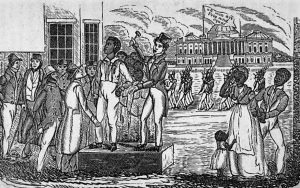
Phebe and her family were sold at auction
Previously in the novel: War Secretary Stanton holds the Lincolns captive under guard in the White House basement. Janitor Gabby Zook by accident must stay in the basement too. Cook Phebe sees all and tries to tell butler Neal what she thinks.
“Why would I get mad?” Neal demanded of Phebe.
“Because you’re always mad, especially at the white folks,” Phebe said. “I see it in your eyes. You really hate them, and I don’t get it. I mean, you’re born free—”
“Yes, I’m free, for what good that does me,” he interrupted her angrily, spitting on the floor.
“I—I don’t understand…”
“I was born the son of a freeman in the city of Boston. He was the son of a freeman, all in a long line of tutors, teaching French to Boston merchants who traded with Haiti and other points in the Caribbean.”
“You speak French?”
“Yes. So what?” He paused. “My mother, as a child, came to Boston in the middle of the night in her mother’s arms, a slave from a Virginia tobacco plantation.”
“A runaway slave,” Phebe murmured.
“She grew up cooking and sewing in wealthy New England homes. That’s where she met my father, who tutored the master of the house. They married, found a comfortable apartment, and had me. I was supposed to be the one to climb the next rung on the racial equality ladder, perhaps the ministry, law, or medicine. But it was not to be. Ever heard of the Fugitive Slave Law?”
“Yes.”
“Slave owners tracked down runaways in Free states, and local authorities and ordinary citizens had to help.”
“So they came for your grandmother?” Phebe asked.
“No. She was dead. They came for my mother. My grandmother stole my mother from the farmer, who wanted her back.” Neal paused. “And her offspring. Any child from her womb was his property too.”
Phebe jumped when she realized he was talking about himself.
“I remember when they took my mother. Her cries woke me up. At first my father was angry, shouting at her. He didn’t know he’d married a runaway. He stopped yelling when she said she didn’t remember anything before life in Boston kitchens. White men banged at the door, demanding they come out. My father took me from my bed and pulled down the attic ladder. He told me to be quiet, and my mother kissed me, her lips still moist from her tears. He had just closed the attic ladder when the slave catchers broke through. I cried as I heard them drag her away. I never saw her again. ”
“I haven’t seen my mother in a long time either, but I still have hope.” Immediately Phebe wished she had not spoken.
“You’ve been bought and freed, all legal. You got hope because you don’t know no better. No, I don’t have to worry about being taken South anymore. But I don’t have a chance for a profession now.” Neal sighed and mellowed. “When my father told me he’d arranged a job for me in Washington, I thought it might lead to something, but when I arrived at the White House, they sent me to the basement to be a butler.”
“Butler is a good job,” Phebe said, trying to be encouraging. “Why, on the plantation the butler was—”
“This ain’t the plantation, girl,” he interrupted. “This is the world. This is life. We may be free, but we ain’t white.”
“I know.”
“Well, tell me,” he said. “Who do you think the woman in the billiards room is?”
“I was talking to Mrs. Keckley. She’s the lady who sews the Mrs. Lincoln’s clothes. I said to her things had been odd for the last few months. She got real quiet, looked around, then pulled me closer and made me promise not to tell anyone.”
“Not to tell what?”
“She said when she went to fit the Mrs. Lincoln for a new dress the middle of September she saw right off something was different. The Mrs. Lincoln was bigger, across her chest. The missus looked real flustered, Mrs. Keckley said, laughing and rambling on about gaining too much weight. When a woman gets fat, it goes on her butt or hips or belly first.”
“Just what are you trying to tell me?”
“I’m still scared how you’ll take it.”
“You still think like a slave.” Neal snorted.
“Well,” Phebe said softly. “It’s all I know.”
Her owner was Pierce Butler, whose grandfather authored the fugitive slave clause in the United States Constitution. Her earliest memories were of being held by his beautiful wife, who was rumored to be a fancy actress from England. Then the master’s wife had gone away. When Phebe asked about her, she was told to hush and mind her own business. The rest of her childhood was uneventful, though filled with hard work, until all the slaves on the plantation were loaded on a ship and taken down the Altama River to Savannah, where they were taken to the Kimbrough Race Track during a torrential downpour. Men prodded them, looked in their mouths, tested their muscles, and stood back, cocking their heads in judgment.
Earlier in the day she had watched her father being led away, and later her mother, her eyes filled with tears. Feeling all was lost, Phebe used all her willpower to keep from crying. Soon it was her turn to stand on the block, and a miracle happened. When the bidding was over, Phebe met her new owner, Mortimer Thompson, a reported for the New York Tribune, who said she would be freed as soon as they arrived in New York City. But what will I do? Phebe had asked him; How will I support myself? He had taken her hand.
“I know an old friend of yours,” he said.
Her old friend was Mrs. Butler, whose stage name, Fanny Kemble, was in large letters across a theater marquee.
“What a pretty face,” Mrs. Butler said with a gush as she patted Phebe’s cheeks.
“Thank you, ma’am,” Phebe said shyly.
“I wish I could afford to employ another maid, but I can’t.” When Phebe’s face fell, she added, “But don’t give up hope. I’ve friends all over, here in New York, in London, and in Washington.” She smiled at Phebe. “How would you like a job in the Republican administration? I’ve many contacts with abolitionists.”
By the time the whirlwind had ended, Phebe lived in the basement of the Executive Mansion, cooking meals and witnessing the nation’s business first hand. Which brought her back to Neal’s question about who she thought was in the billiards room. Before she spoke, Phebe realized she risked not only Neal’s ridicule, but also the loss of her job—a step backward toward slavery she did not want to take.
“I don’t know.” She walked to the door and opened it. “Now that I think about it, there’s nothing wrong, nothing wrong at all.”